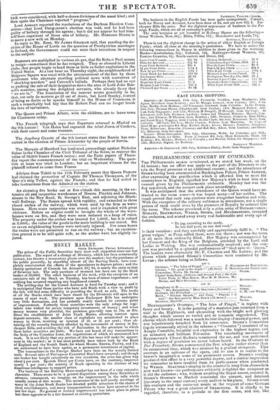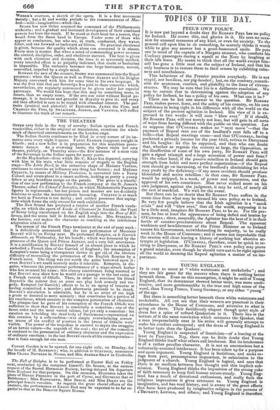PHILHARMONIC CONCERT BY COMMAND.
THE Philharmonic season terminated, as we stated last week, on the 3d instant ; but an effort was made on the part of the Directors to ob- tain the Royal presence at an additional concert ; and the attendance of SPORE having been commanded at Buckingham Palace, Prince ALBERT, after expressing the gratification which it afforded him to meet his countrymen in England, signified her Majesty's wish to hear him at a concert given by the Philharmonic orchestra. Monday last was the day appointed, and the concert took place accordingly. It was anticipated that the attendance of the Queen would have at- tracted to the room some—it was hoped many—of her nobles. The result proved that such expectations were altogether baseless and vain. With the exception of the solitary nobleman in attendance, not a single person of rank could even by the presence of Royalty be seduced into the room. The scheme presented only a grim array of German names: MOZART, BEETHOVEN, WEBER, SPORE, and MENDELSSOHN, occupied the orchestra, and scared away every real fashionable and every ape of fashion.
" To jog, according to the mode,
• In one dull pace, on one dull road,"
is their vocation ; and they carefully and appropriately fulfil it. " The . great vulgar," as PEEL called them, were not there ; nor was the room at all more than ordinarily filled. Her Majesty was accompanied by her Consort and the King of the Belgians, attended by the Lord and Ladies in Waiting. She was enthusiastically received ; and the con- cert was preluded by a splendid performance of " God save the Queen." The leaders were alternately Mr. F. CRAMER and Mr. LODER; and the pieces which preceded SPORE'S Concertino were conducted by Mr. LUCAS ; the scheme being as follows.
ACT 1. Overture, " The Isles of Fingal" F. AfENDgl.SSOHN BARTHOLOV, Chorus, " Oh, great is the depth ! " (St.Paul) F. MENDELSSOHN BARTHOLDY. Concertino. Violin, Dr. SPOOR STOUR. Choral Symphony. (Scherzo and Second Part.) the. Sulu Voice Parts by Miss BIRCH, MISS M. B. Mons, Mr
HOBBS, and Heir STADDiOr BEETHOVEN.
ACT U.
Symphony in D
Air, " Der Kriegeslust," Herr STAUDIGI. (JeSSOWIC)... • Overture. Der Freischads Recit., " Sidonie Spoude." and Coro. " Plarido e it mar," the Solo pact by Miss Buten (Idonseneo) Overture, Macbeth MENDELSSOHN'S Overture, " The Isles of Fingal," is replete with fancy and beauty. It is the painting of a musician just returned from a visit to the Highlands, and abounding with the bright and glowing thoughts which scenes so varied and so romantic engendered. The chorus which followed was a much feebler display of musical power, and was injudiciously detached from its connexion. SPORE'S Concertino (again erroneously styled in the scheme a " Concerto ") consisted of an Adagio Cantabile, beautiful and expressive in the highest degree, and an animated and brilliant Polonaise. The concluding movement of BEETHOVEN'S Choral Sinfonia terminated the act, and was performed with a degree of precision we never before heard. In the Overture to Der Freischutz, SPORE commenced the first allegro rather slower than its accustomed time, which was attained by a gradual stringendo. This overture is an epitome of the opera, and its aim is to realize to the hearer's imagination some of its prominent scenes. SPORE'S reading produced this effect in a very powerful degree, and a similar impression we remember to have resulted from its performance when conducted by WEBER. STAUDIGL'S singing in the admirable song from Jessonda is now well known—its performance evidently delighted the composer as it did the audience ; who, without awaiting the Royal assent, encored it SPORE'S Overture to Macbeth concluded the concert, and detained (contrary to the usual custom) every auditor in his place. SPORR wrote this overture and the entre-act music at the request of some German Prince who was a great admirer of SHAKSPERE. It is chiefly to be regarded, therefore, as a prelude to the first scene, and not, like ,
MOZART. SPOHR.
C. M. VON WEBER.
MOZART. SPOHR.
WEBER 'S overture, a sketch of the opera. It is a first movement merely ; but a fit and worthy prelude to the commencement of Mac- maginativ SPOHR has now thrice assumed the command of the Philharmonic orchestra ; and a gradual and increased development of' their combined powers has been the result. If he stood at their head for a season, they would form the finest band in Europe. Under some of those who appear as conductors, but who are, in truth, conducted, they waver, falter, and run forward or backward ad libitum. No practical obedience is given, because the quality which alone can command it is absent. Every man is master. But when a mind of commanding power assumes the control, discipline, order, and obedience succeed. The beat is given with such clearness and decision, the time is so accurately marked, every intended effect is so palpably indicated, that doubt or hesitation is impossible. The orchestra becomes one large instrument, moved, controlled, impelled by a single mind.
Between the acts of the concert, SPOHR was summoned into the Royal presence ; when the Queen as well as Prince ALBERT and his Belgian Majesty conversed with him for some time in his own language. It was the first visit that our Sovereign has paid to these concerts ; which, nevertheless, are regularly announced to be given under her especial patronage. We would fain hope that this may he something more, in future, than an empty name. If the arts can exist without Royal pa- tronage, it is decorous and graceful in Royalty to give it ; and every aid thus afforded is sure to be repaid with abundant interest. The por- traits (poetical and pictorial) of ELIZABETH, JAMES the First, and CHARLES the First, by SHARSPERE, JONSON, and VANDYCK, will suffice to illustrate the truth of our remark.



























 Previous page
Previous page